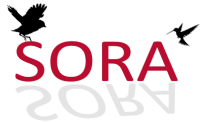Serological Investigation of Captive and Free Living Raptors
Abstract
Interest in the role of raptors in zoonotic diseases and concern over the disease agents that can be introduced into raptor colonies by birds from the wild prompted a serological investigation of birds available to the University of California at Davis. Seventy-one raptors of 14 species were tested for antibodies against two or more of the following disease agents: Toxoplasma gondii, Coxiella burnetii (Q Fever), Newcastle disease virus, adenovirus, reovirus, and infectious bursal disease virus. The techniques used included the indirect hemagglutination, microagglutination, hemagglutination ihibition, and agar gel precipitin tests.
Collectively, 30% (21/71) of the birds were seropositive for Q fever rickettseae antibodies, 8% (6/71) were seropositive for Toxoplasma antibodies, and one of 70 had antibodies against infectious bursal disease virus. Antibodies against Newcastle disease virus, adenovirus or reovirus were not detected. The species of raptors that had antibodies against toxoplasmosis were Redtailed Hawk (Buteo jamaicensis) 23% (3/13), Red-shouldered Hawk (Buteo lineatus) (1/1), Great Horned Owl (Bubo virgiianus) (1/10), and Turkey Vultures (Cathartes aura) (1/14). The raptors seropositive for C. burnetii were Golden Eagle (Aquila chrysaetos) 100% (6/6), Red-tailed Hawk 69% (9/13), Vultures 29% (4/14), Harris' Hawk (Parabuteo unicurctus) 14% (1/7) and Great Horned Owl 10% (1/10). A Redtailed Hawk was seropositive for infectious bursal disease virus.

